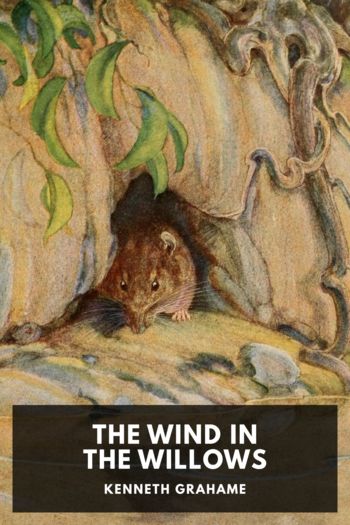The Wind in the Willows, Kenneth Grahame [best ereader for comics txt] 📗

- Author: Kenneth Grahame
Book online «The Wind in the Willows, Kenneth Grahame [best ereader for comics txt] 📗». Author Kenneth Grahame
The main river reached again, they turned the boat’s head upstream, towards the point where they knew their friend was keeping his lonely vigil. As they drew near the familiar ford, the Mole took the boat in to the bank, and they lifted Portly out and set him on his legs on the towpath, gave him his marching orders and a friendly farewell pat on the back, and shoved out into midstream. They watched the little animal as he waddled along the path contentedly and with importance; watched him till they saw his muzzle suddenly lift and his waddle break into a clumsy amble as he quickened his pace with shrill whines and wriggles of recognition. Looking up the river, they could see Otter start up, tense and rigid, from out of the shallows where he crouched in dumb patience, and could hear his amazed and joyous bark as he bounded up through the osiers on to the path. Then the Mole, with a strong pull on one oar, swung the boat round and let the full stream bear them down again whither it would, their quest now happily ended.
“I feel strangely tired, Rat,” said the Mole, leaning wearily over his oars, as the boat drifted. “It’s being up all night, you’ll say, perhaps; but that’s nothing. We do as much half the nights of the week, at this time of the year. No; I feel as if I had been through something very exciting and rather terrible, and it was just over; and yet nothing particular has happened.”
“Or something very surprising and splendid and beautiful,” murmured the Rat, leaning back and closing his eyes. “I feel just as you do, Mole; simply dead tired, though not body-tired. It’s lucky we’ve got the stream with us, to take us home. Isn’t it jolly to feel the sun again, soaking into one’s bones! And hark to the wind playing in the reeds!”
“It’s like music—faraway music,” said the Mole, nodding drowsily.
“So I was thinking,” murmured the Rat, dreamful and languid. “Dance-music—the lilting sort that runs on without a stop—but with words in it, too—it passes into words and out of them again—I catch them at intervals—then it is dance-music once more, and then nothing but the reeds’ soft thin whispering.”
“You hear better than I,” said the Mole sadly. “I cannot catch the words.”
“Let me try and give you them,” said the Rat softly, his eyes still closed. “Now it is turning into words again—faint but clear—Lest the awe should dwell—And turn your frolic to fret—You shall look on my power at the helping hour—But then you shall forget! Now the reeds take it up—forget, forget, they sigh, and it dies away in a rustle and a whisper. Then the voice returns—
“Lest limbs be reddened and rent—I spring the trap that is set—As I loose the snare you may glimpse me there—For surely you shall forget! Row nearer, Mole, nearer to the reeds! It is hard to catch, and grows each minute fainter.
“Helper and healer, I cheer—Small waifs in the woodland wet—Strays I find in it, wounds I bind in it—Bidding them all forget! Nearer, Mole, nearer! No, it is no good; the song has died away into reed-talk.”
“But what do the words mean?” asked the wondering Mole.
“That I do not know,” said the Rat simply. “I passed them on to you as they reached me. Ah! now they return again, and this time full and clear! This time, at last, it is the real, the unmistakable thing, simple—passionate—perfect—”
“Well, let’s have it, then,” said the Mole, after he had waited patiently for a few minutes, half-dozing in the hot sun.
But no answer came. He looked, and understood the silence. With a smile of much happiness on his face, and something of a listening look still lingering there, the weary Rat was fast asleep.
VIII Toad’s AdventuresWhen Toad found himself immured in a dank and noisome dungeon, and knew that all the grim darkness of a medieval fortress lay between him and the outer world of sunshine and well-metalled high roads where he had lately been so happy, disporting himself as if he had bought up every road in England, he flung himself at full length on the floor, and shed bitter tears, and abandoned himself to dark despair. “This is the end of everything” (he said), “at least it is the end of the career of Toad, which is the same thing; the popular and handsome Toad, the rich and hospitable Toad, the Toad so free and careless and debonair! How can I hope to be ever set at large again” (he said), “who have been imprisoned so justly for stealing so handsome a motorcar in such an audacious manner, and for such lurid and imaginative cheek, bestowed upon such a number of fat, red-faced policemen!” (Here his sobs choked him.) “Stupid animal that I was” (he said), “now I must languish in this dungeon, till people who were proud to say they knew me, have forgotten the very name of Toad! O wise old Badger!” (he said), “O clever, intelligent Rat and sensible Mole! What sound judgments, what a knowledge of men and matters you possess! O unhappy and forsaken Toad!” With lamentations such as these he passed his days and nights for several weeks, refusing his meals or intermediate light refreshments, though the grim and ancient gaoler, knowing that Toad’s pockets were well lined, frequently pointed out that many comforts, and indeed





Comments (0)